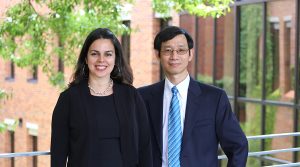This article was originally posted at https://news.fsu.edu/news/education-society/2019/08/06/fsu-higher-education-researchers-receive-grant-to-study-community-college-pathways-to-computing-degrees/
Women graduate college at higher rates than men, yet women earn only 19 percent of bachelor’s degrees in computer science.

Two Florida State University researchers have received a three-year National Science Foundation grant for $900,749 to investigate this disparity. It will focus on Florida, one of the most diverse states in the nation, and community college pathways to computing degrees.
Lara Perez-Felkner, associate professor of higher education, and Shouping Hu, Louis W. and Elizabeth N. Bender Endowed Professor of Higher Education, have teamed up to lead the project. Perez-Felkner’s research focuses on the gender gap in STEM fields, while Hu’s centers on student success pathways through Florida community colleges.
“There has been a troubling gender gap in STEM fields for years,” said Perez-Felkner, the principal investigator for the project. “High-paying computing fields especially have been losing ground with undergraduate women. This is deeply concerning given the growth and opportunities they and their families would otherwise be able to access.”
The grant will allow Hu and Perez-Felkner to hire three full-time graduate students to help examine the degree to which community colleges are a viable pathway for women to enter computing fields, such as computer science and information technology (IT).
The project strongly aligns with the research mission of FSU’s Center for Postsecondary Success, where Hu is the founding center director and Perez-Felkner is a senior research associate. It also connects with key initiatives at NSF around broadening participation and inclusion in STEM and core, fundamental research in STEM education.
“While we’ve seen the health field become a viable STEM area for women over the past few decades, for some reason IT and computer science have been resistant to that change,” Perez-Felkner said. “So, this is a really intriguing space to see what tools, courses and support will be helpful for getting community college women to succeed in their ambition to get degrees in computing.”
Researchers will connect with Florida-focused partners such as the Florida College System and local school districts, as well as partners from across the country who are working with similar data and initiatives to examine data from different perspectives. Findings will be used to enhance state and national efforts to identify supportive and sustainable mechanisms for a more inclusive pool of computer scientists and technicians.
Perez-Felkner said this research is about equity and social justice in an area that currently has the largest gender gap in one of the fastest-growing and highest-earning fields. The research also happens to align with a recent executive order from Florida Gov. Ron DeSantis who charged education leaders with examining the state’s offerings of career and technical training.
“Given the increase in girls taking high school mathematics and science courses, they are positioned to enroll in and successfully complete computing courses in community college that they can use to transfer to bachelor’s programs and enter the computing labor market,” Perez-Felkner said. “The field has tended to ignore community college as a pathway for women in STEM, but that seems to be a real oversight we’re hoping to remedy.”


